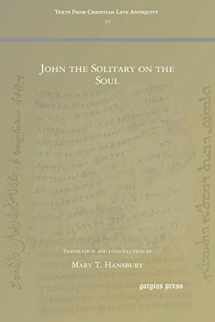
John the Solitary on the Soul (Texts from Christian Late Antiquity)
Book details
Summary
Description
This translation of John the Solitary is based on the Syriac text edited by S. Dedering. It is a description of the life of the soul; the framework, a tripartite schema rooted in St. Paul, traces progression through the stages in the life of the inner person. The soul s adversaries along the way are the passions which John deals with in an original way, bearing little if any Evagrian influence. Some of the more important themes are hope, eschatology and love. Scripture seems to be the most consistent influence in John s writings. I. Hausherr, who has written extensively on John, finds no patristic citation other than one reference to Ignatius of Antioch. And although on occasion there is a certain resonance with Greek ideas, Hausherr says that John, like Aphrahat, is driven by Scripture. John makes extensive use of medical imagery, perhaps derived originally from Galen but mediated through Nemesius of Emesa. The earlier dating now posited for his On the Nature of Man (ca 390) makes this influence more plausible. Part of the problem in coming to terms with influences on John s work is the fact that so little is known about his person. The controversies concerning his identity are referenced in the Introduction. It has been suggested that John was influenced by Theodore of Mopsuestia, concerning hope and eschatology. This led to a consideration here of Theodore s works, not his Christology or his exegesis but his anthropology, for example in the Catechetical Discourses, characterized by a discussion of Baptism. McLeod has suggested a connection between Theodore and Jewish exegesis. Based on this hypothesis, certain aspects of Jewish apocalyptic tradition have been examined as possible ways of also interpreting John s eschatology and his understanding of this world and the world to come, a fundamental aspect of all his work.


We would LOVE it if you could help us and other readers by reviewing the book
Book review



